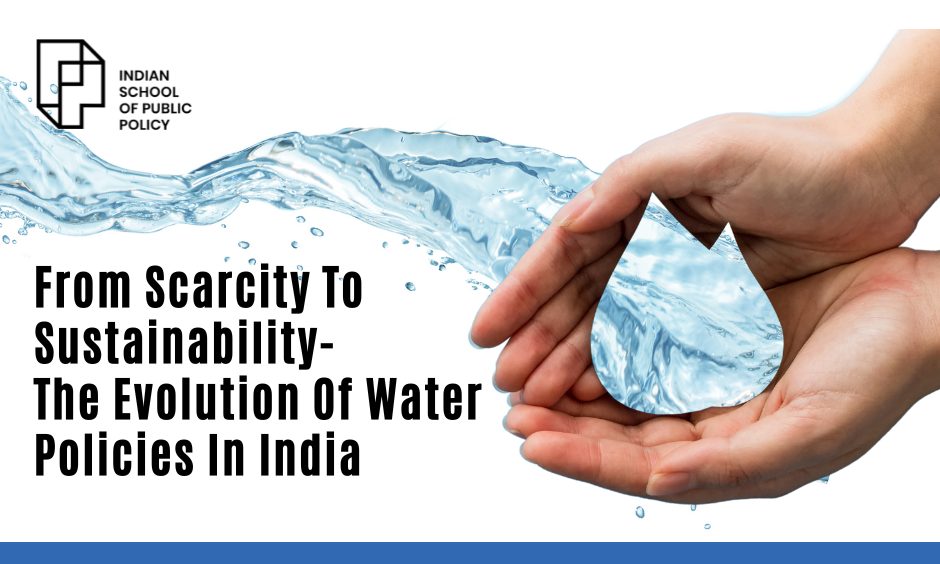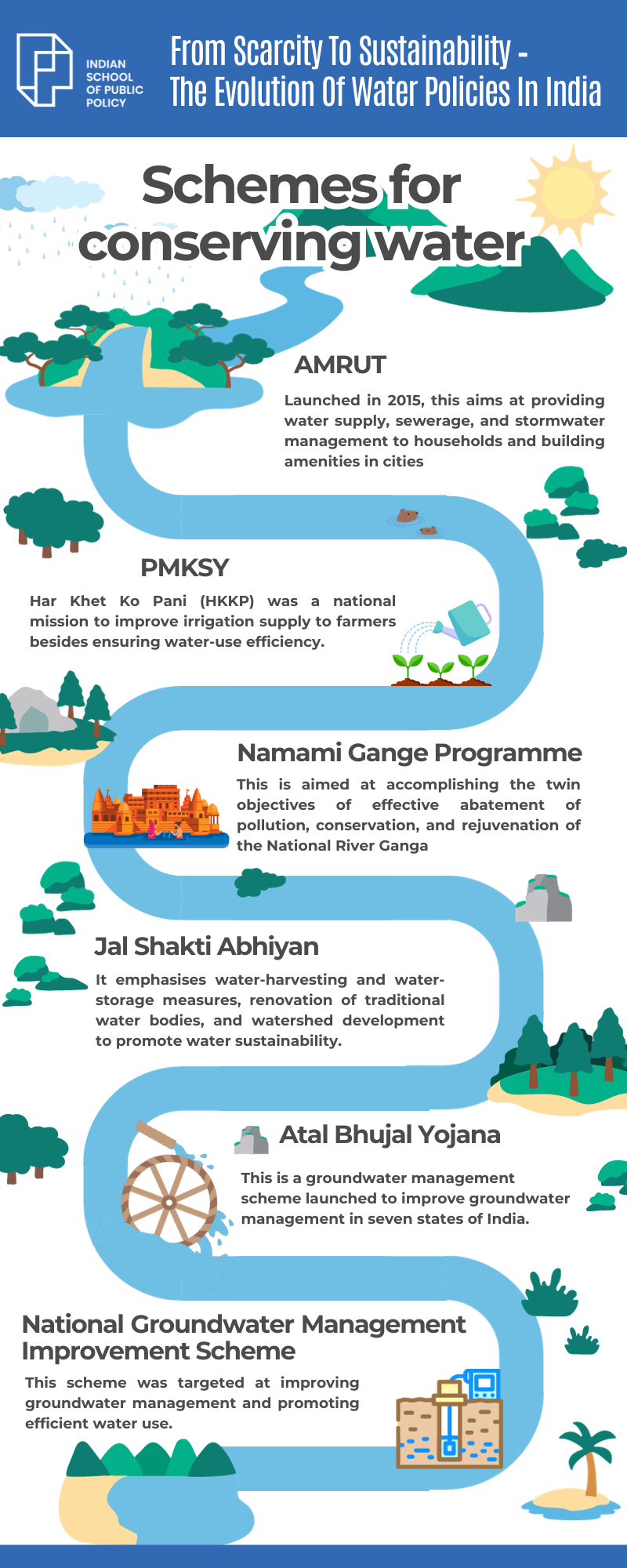
From Scarcity To Sustainability – The Evolution Of Water Policies In India

Water as a substance has a unique characteristic. It is found naturally in all the states of matter- solid, liquid, or gas. It is estimated that water covers almost three-fourths of the earth’s surface. However, less than one percent is considered to be fresh water and usable for consumption. This is found in lakes, ponds, rivers, and groundwater. This freshwater is recharged by the hydrological cycle and meets the needs of the human population.
The population of India is almost 19% of that of the world. However, its freshwater availability is only 4% of the world’s freshwater resources. The per capita availability of water is perilously close to the international threshold of water scarcity which is 1,000 m3 per person. Rapid industrialisation, economic development, and population growth continue to put extreme pressure on the meagre freshwater resources. On the other hand, climate change is also playing an increasing role in an already complex scenario. It has been estimated that water demand in India could go up almost 70% by 2025 leading to a massive gap. In a situation where India is already in a water-stressed situation, the future scenario is grim and requires a radical rethink of policy measures.
Water Scarcity in India
There are a range of issues that affect water availability in India on a macro level. Some of them are interdependent and could be attributed to
- Population growth
- Rapid and unplanned urbanisation
- Industrialisation
- Agriculture
- Climate
- Lack of water management
- Inadequate infrastructure and storage
- Pollution
As the projected water demand is estimated to exceed supply by 70% by 2025, agriculture would be the worst hit, followed by water-intensive industries. This could result in a 6% loss in GDP by 2050.
The recent past has seen a shift where India has started to look at a comprehensive approach that is centred around sustainability. The idea is to ensure water security along with tackling environmental concerns behind water exploitation. With inevitable growth and the march towards one of the largest populated economies, policymakers have taken steps to transition to equitable distribution and sustainable policies.
Also Read : Water Crisis in India: Strategies to Save Water
Water Policies in India and Their Transformation Towards Sustainability
Pre-Independence to 1970s
In this era, water policies in India are primarily focused on enhancing agricultural productivity by augmenting irrigation. Investments in projects were undertaken to harness water for irrigation and power generation. The primary focus was to boost agricultural output and make Indian food sufficient.
The Green Revolution in the 70’s led to a significant agricultural transformation to ensure food security. The high-yielding crop varieties and modern agricultural techniques required extensive irrigation and this has led to an increase in the demand for water due to the water-intensive nature of modern farming practices.
The Industrialisation Era of 1970s-1990s
This period saw the rapid urbanisation and industrialisation of India. An increasing demand for water from urban India and industries led to pressure on thin resources and the emergence of water scarcity. Over-exploitation of aquifers and surface water bodies led to a situation where water scarcity assumed alarming proportions.
In 1987, the National Water Policy was formulated to tackle the need for integrated water resource management, conservation, and equitable distribution of water. This was the cornerstone for subsequent policies that built on the need for sustainable development in the water sector.
Economic Reforms in the 1990s and Onwards
The water sector underwent a radical change in the wake of reforms. Private participation and market-driven approaches to water management were recognised as the way forward. While these aimed at efficiency and financial sustainability, equitable access to water resources was a neglected area.
At the turn of the century, the policy framework started to look at a river basin approach to water management. A holistic view looked at interconnecting the water resources of India within river basins. Sustainability and the protection of water bodies started to gain prominence. The focus has now shifted to the conservation and sustainable utilisation of water resources.
Climate change led to the formulation of the National Water Mission in 2008. This focused on sustainable water management, improving water use efficiency, and promoting water conservation practices across sectors. It underscored the critical role of water in climate change adaptation and mitigation strategies.
Adapting to Climate Change – Policy Reforms
As climate change has shown its ugly side in recent years, it has now become a pivotal factor. The focus has now emerged on climate-resilient water policies as changing weather, altered monsoon precipitation, and extreme weather events have become frequent. In recent years India continues to evolve its water policies to tackle emerging challenges and promote sustainable water management.
Several initiatives and policy developments have been undertaken for efficient water resource governance in the period post-2010. A multipronged approach that looks at water as a key resource, recognises the need for a sustainable approach in the long run. The framework was laid down as the National Water Mission (2011) which looks at sustainable water use, enhancing water use efficiency, and increasing the availability of water. The mission emphasises water conservation, rainwater harvesting, and improving water use efficiency across sectors.
As part of the broader framework of the National Water Mission, initiatives have been formulated to achieve the targets of a sustainable and equitable approach to water management. Some of these are:
- AMRUT – Launched in 2015, this aims at providing water supply, sewerage, and stormwater management to households and building amenities in cities.
- PMKSY – Har Khet Ko Pani (HKKP) was a national mission to improve irrigation supply to farmers besides ensuring water-use efficiency and improving on-farm water management to reduce wastage and promote sustainable agricultural practices.
- Namami Gange Programme – This is aimed at accomplishing the twin objectives of effective abatement of pollution, conservation, and rejuvenation of the National River Ganga.
- Jal Shakti Abhiyan – “Catch the rain, where it falls, when it falls”. Jal Shakti Abhiyan was launched in 2019 to accelerate water conservation efforts across the country. It emphasises water-harvesting and water-storage measures, renovation of traditional water bodies, and watershed development to promote water sustainability.
- National Groundwater Management Improvement Scheme – This scheme was targeted at improving groundwater management and promoting efficient water use. It encourages community participation, adoption of efficient agricultural practices, and groundwater recharge.
- Atal Bhujal Yojana – This is a groundwater management scheme launched to improve groundwater management in seven states of India.
Also Read : The Foreign Economic Policy of A Rising India
While there is a shift in water policies in India towards sustainability and distribution, the way forward is to focus on achieving water security, protecting the environment, and building climate resilience.
It is a given that water management is crucial for the economic development of India. The lopsided population and water availability make it imperative for the formulation and implementation of policies that focus on sustainability. This throws light on the dire need to have skilled, highly qualified policymakers.
But where do these policymakers obtain their skills from?
The Dire Need For Skilled Policymakers
As India navigates the evolving dynamics of its agriculture sector, the challenges and opportunities within its agriculture policy for food security become increasingly evident. With the right blend of innovation, technology, and policy reform, the agriculture sector can regain its strength while ensuring food security for all citizens. However, this transformation requires the collective efforts of industry players, citizens, and most of all – the expertise of skilled policymakers.
Where can policymakers/policy aspirants gain expertise?
Register your Interest to Study at ISPP
The Indian School of Public Policy
The Indian School of Public Policy took its official stride on October 23, 2018, at the Constitution Club of India, New Delhi, with eminent figures such as Shri N.K. Singh, Shri Rajiv Mehrishi, and Shri Gurcharan Das graced the occasion. A panel discussion featuring notable experts from institutions like TISS, Twitter Inc. India, Brookings Institution, Uber India, and GMR strongly underscored the pressing need for a fresh breed of policy professionals.
Incubated in 2018 by the Centre for Civil Society (CCS), a renowned public policy think tank, ISPP was conceived by a distinguished council comprising senior academicians, policy mavens, and philanthropists. Their shared vision is to cultivate a new cadre of policy leaders who can make a transformative impact in India and the wider region.
Post Graduate Programme in Public Policy, Design and Management
The programme delves deeply into the realm of public policy, equipping students with the ability to not only comprehend the intricacies of policy but also to apply design and management principles effectively. It nurtures students into adept policy leaders, fostering skills in system thinking. Beyond policy analysis and development, the curriculum imparts an understanding of crucial real-world factors such as financial considerations, skill requirements, and ethical dimensions.
Programme Highlights
A central focus of the programme lies in mastering the art of translating policies into actionable strategies, adeptly managing them, and rigorously evaluating their impact in the domains of public administration and policy.
- HARRIS UCHICAGO: CERTIFICATE IN PUBLIC POLICY
- IMMERSIVE LEARNING PROJECTS
- INTERACTIVE LABS
- CAREER SUPPORT & PLACEMENTS
- TEA & POLICY
Academic Pedagogy
ISPP’s educational approach centers on nurturing proficiency in skills, fostering ethical values, and cultivating leadership qualities to empower individuals capable of effecting meaningful change. The curriculum comprises a blend of classroom instruction, skill enhancement, hands-on practical experience, and dedicated training in leadership and management. It encompasses a spectrum of courses, ranging from fundamental to core, along with supplementary offerings.
Learn more about the curriculum here.
ISPP Success Stories


Infographic



